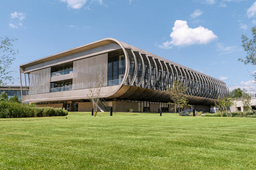FEBS Excellence Awardee spotlight: Abdelrahim Zoued

What did this FEBS Excellence Award mean to you?
Receiving the FEBS Excellence Award is a tremendous honor in my early career. It recognizes the efforts of not just myself, but also my team, and validates the direction of our research. It is also deeply motivating, as it reinforces the importance and potential impact of the questions we are tackling in our field.
How will the award help you as an early-career group leader?
The award provides critical financial support, enabling us to pursue innovative, high-risk projects that might not yet qualify for larger funding schemes. It also raises the visibility of our work in the scientific community and enhances opportunities for collaborations. Importantly, it bolsters my confidence as an emerging group leader, reassuring me that our research is seen as valuable and impactful.
Tell us a little about your research area and career stage
As an early career researcher, I am investigating the molecular interactions happening at the host–Legionella interface. My research focuses on how the lung proteome is altered during infection, identifying active enzymes from both host and pathogen, and uncovering host-derived bacterial binding proteins (HBBPs). I lead this work at the Centre International de Recherche en Infectiologie (CIRI) in Lyon, which I joined in 2023.
What drew you to work in this area?
Bacterial pathogens have fascinated me since my undergraduate studies. The intricate interactions between microbes and their hosts – how pathogens evolve strategies to subvert complex immune defenses – felt like solving a puzzle. The translational potential of this work, especially in understanding emerging infectious diseases, adds an extra layer of meaning to my research.
How has time spent doing research abroad influenced your scientific career?
My time abroad, particularly in Boston, was transformative. It exposed me to cutting-edge methodologies and broadened my perspective on how science is conducted globally. Working in a highly collaborative and innovative environment helped me build confidence and critical skills that I’ve brought back to my group in Lyon. It also reinforced the value of international networks in tackling complex scientific challenges.
What are the biggest challenges in your role currently?
Balancing scientific ambition with practical constraints is a significant challenge. Securing consistent funding to support my group’s work, mentoring young scientists effectively, and managing administrative responsibilities while driving innovative research are demanding but rewarding aspects of the role. Additionally, navigating the uncertainty of early-career leadership, especially in a competitive funding landscape, can be daunting.
What would be your advice to PhD students?
Stay curious and resilient. Research is full of challenges, but it is also deeply rewarding. Don't hesitate to ask questions, seek feedback, and build a supportive network of mentors and peers. Importantly, choose a project and a mentor that truly inspire you – passion for your work is the key to pushing through difficult moments. Lastly, keep an open mind and embrace opportunities that take you out of your comfort zone; they often lead to the most significant growth.
Photo by Praewthida K on Unsplash.





Join the FEBS Network today
Joining the FEBS Network’s molecular life sciences community enables you to access special content on the site, present your profile, 'follow' contributors, 'comment' on and 'like' content, post your own content, and set up a tailored email digest for updates.